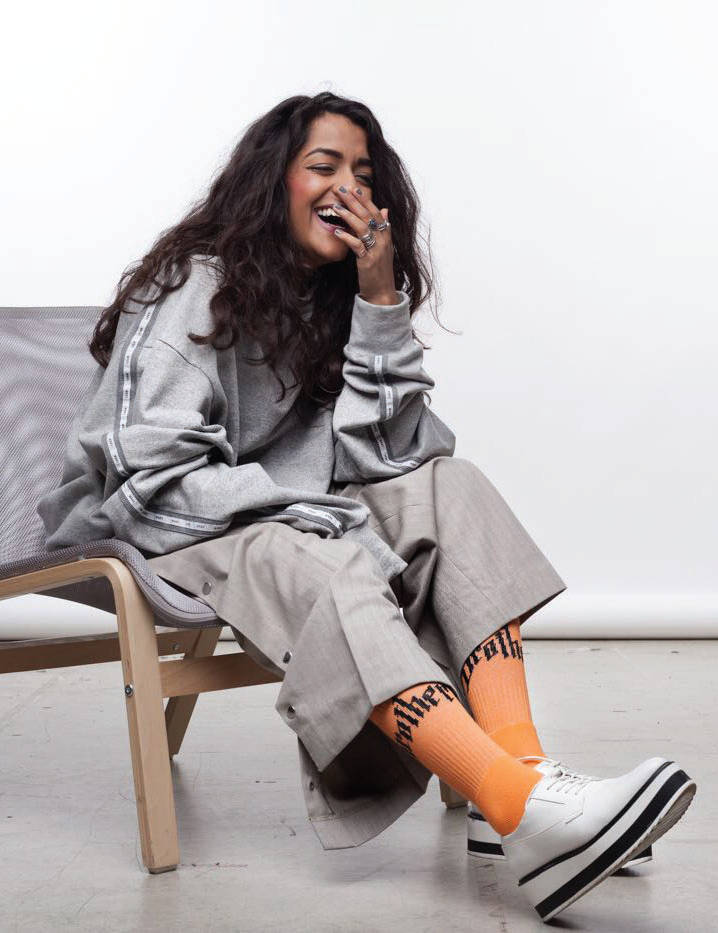
NF1 IN THE SPOTLIGHT: OPTIMISM,
FASHION, & FOLLOWING YOUR DREAMS
AN INTERVIEW WITH AROOJ AFTAB
Arooj Aftab sounds wise beyond her years from the moment we hop on the phone – so much so that I almost don’t believe her when she says “Yeah, I’m 23.”
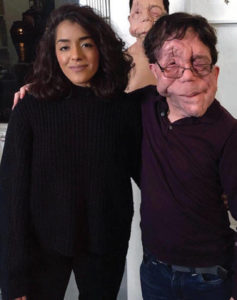 A fashion blogger, influencer, and stylist, Arooj is known online for her distinct baggy clothing style and put together outfits. Though I had followed her Instagram at @vogue_wonders, where Arooj currently has over 10,000 followers, I wasn’t sure what to expect when we spoke. I shouldn’t have been nervous. From the moment we get on the call, her positive energy and sunny outlook was clear: Arooj seems to find inspiration everywhere she looks. “I find inspiration in what I read, what I see, what I look at, magazines, fashion trends already out there, and more – I try to find as much inspiration as I can on a daily basis to help people on my platform.”
A fashion blogger, influencer, and stylist, Arooj is known online for her distinct baggy clothing style and put together outfits. Though I had followed her Instagram at @vogue_wonders, where Arooj currently has over 10,000 followers, I wasn’t sure what to expect when we spoke. I shouldn’t have been nervous. From the moment we get on the call, her positive energy and sunny outlook was clear: Arooj seems to find inspiration everywhere she looks. “I find inspiration in what I read, what I see, what I look at, magazines, fashion trends already out there, and more – I try to find as much inspiration as I can on a daily basis to help people on my platform.”
For Arooj, helping people goes well beyond sharing her stylish, well-curated outfits. While her fashion sense is inspirational already, Arooj is particularly remarkable for how she uses her fashion platform to raise awareness around neurofibromatosis type 1 (NF1), which she is personally affected by. Particularly in the modelling industry,which has a history of favouring certain body types, being honest about her condition has been an incredibly brave and impactful step that has allowed Arooj to help people both within her home country of the UK and well beyond.
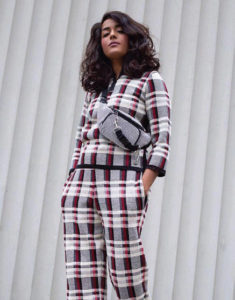 “My main style consists of oversized fitting clothes which I share on my Instagram. But in working in the fashion industry [in roles spanning from scouting to digital content], I want to show that no matter what you’ve got, you can be who you want to be. I’ve always been interested in fashion and intrigued by the way clothing fits on our bodies, and how it becomes a representation of who we are. It’s not just about clothing – it’s about expression.” Arooj didn’t start off using her platform this way – originally, it was simply to share her own style.
“My main style consists of oversized fitting clothes which I share on my Instagram. But in working in the fashion industry [in roles spanning from scouting to digital content], I want to show that no matter what you’ve got, you can be who you want to be. I’ve always been interested in fashion and intrigued by the way clothing fits on our bodies, and how it becomes a representation of who we are. It’s not just about clothing – it’s about expression.” Arooj didn’t start off using her platform this way – originally, it was simply to share her own style.
“I once saw someone hashtag ‘outfit of the day’ on Twitter and I thought, ‘Hmm, I could do that.’ So I started posting my different outfits. But then as my NF grew, my clothing sizes got bigger, but nobody knew why. I just became known for oversized fits and wearing menswear.”
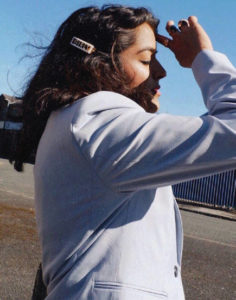 Arooj eventually became shortlisted for a Cosmopolitan Award for her sharp style sense. And yet, while this was exciting, she couldn’t help but regret that no one following her platform knew the true story behind her baggy attire. “It was then I started to feel like I couldn’t accept it; I felt like a bit of a fraud – because no one knew my real story. I felt like I was hiding. I wanted to achieve something but I wanted to be authentic as I achieved it.”
Arooj eventually became shortlisted for a Cosmopolitan Award for her sharp style sense. And yet, while this was exciting, she couldn’t help but regret that no one following her platform knew the true story behind her baggy attire. “It was then I started to feel like I couldn’t accept it; I felt like a bit of a fraud – because no one knew my real story. I felt like I was hiding. I wanted to achieve something but I wanted to be authentic as I achieved it.”
Of course, sharing one’s condition can be a stressful and daunting task. For Arooj, it was also empowering: she hadn’t anticipated how many people she’d reach and touch through her message.
“I shared my story online – it was scary. I was more scared sharing it to Instagram than I was doing a documentary, for some reason. With the documentary I was part of, it was pre-filmed. Online, I wasn’t sure how people would respond in real-time. But honestly, it was incredible. My direct messages went crazy. I got so many followers; I received so much support from people relating to me: some people with NF and some people who didn’t have NF, but who understood how I felt and thanked me for being so authentic.Even to this day I get loads of messages and they’re all so much more positive than I was expecting. A weight was lifted off my shoulders.”
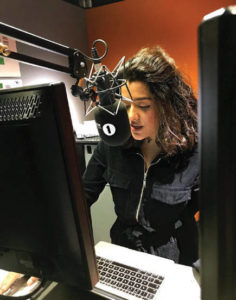 NF is often a hidden condition – so many afflicted by it hide the fact that they have it, which can lead to a lack of general awareness about it. Even though NF1 is found in roughly one out of every 3,000 individuals, there are few public figures who have admitted to having the genetic disorder. Arooj has given many people with NF a woman to look up; a figure in the public eye who is going through the same challenges they are. “I’ve had people write me saying ‘Wow, I’ve never seen a person with NF in the mainstream media.’ It’s kind of crazy to me, because so many people deal with it. For me, I’m just happy I can use my voice to spread the word. When British Vogue mentioned me in an article, it meant a lot to me – to see huge publications pick up my story and share it with their readership has been amazing. More people are learning about what NF means and how common it is.”
NF is often a hidden condition – so many afflicted by it hide the fact that they have it, which can lead to a lack of general awareness about it. Even though NF1 is found in roughly one out of every 3,000 individuals, there are few public figures who have admitted to having the genetic disorder. Arooj has given many people with NF a woman to look up; a figure in the public eye who is going through the same challenges they are. “I’ve had people write me saying ‘Wow, I’ve never seen a person with NF in the mainstream media.’ It’s kind of crazy to me, because so many people deal with it. For me, I’m just happy I can use my voice to spread the word. When British Vogue mentioned me in an article, it meant a lot to me – to see huge publications pick up my story and share it with their readership has been amazing. More people are learning about what NF means and how common it is.”
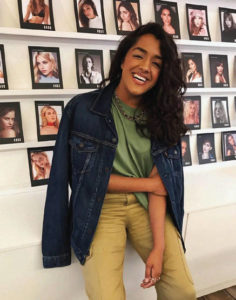 Still, Arooj is incredibly humble when I congratulate her for her bravery and for setting an example for others. “I’m not perfect”, she admits. “What works for me might not work for everybody else. I think the first step is trying to accept your condition, and knowing that it’s not the end. The first stage for me has always been acceptance; understanding myself and my needs. For those newly diagnosed, I would just remind people to not let NF put up barriers for who you want to be in the world. We are so much more than our conditions as people. We have so much more to achieve.”
Still, Arooj is incredibly humble when I congratulate her for her bravery and for setting an example for others. “I’m not perfect”, she admits. “What works for me might not work for everybody else. I think the first step is trying to accept your condition, and knowing that it’s not the end. The first stage for me has always been acceptance; understanding myself and my needs. For those newly diagnosed, I would just remind people to not let NF put up barriers for who you want to be in the world. We are so much more than our conditions as people. We have so much more to achieve.”
In terms of her own achievements, Arooj shows no signs of slowing down. “I’ve just wrapped up another piece for a big fashion magazine, a video on diversity and confidence. I’m also working with some charities, and a few projects on the horizon. I’m moving to London soon and have a lot of exciting work coming up there.” Through it all, she finds important ways to take care of herself. When asked what she does to nurture happiness, she states: “Anything with creative arts, writing, keeps me going – I love arts and imagery. Writing down how you feel always helps: always be reflecting. Looking back on your writing shows how you’re working towards your achievements, how you’re chipping away. I find time to go to galleries, go for walks – but I think you can make anything into your happiness. It doesn’t have to be just one thing.”
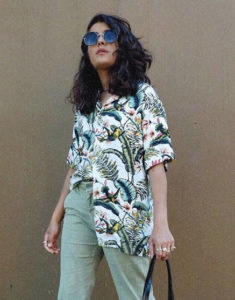 It also doesn’t have to be too planned, or part of a routine. Rather, Arooj speaks to the importance of generally trying to take it day-by-day. “I don’t necessarily have a routine. I think each day we learn, we see what’s good for us, what’s not good for us. I try to get an early night, but it doesn’t always happen. You can’t always know what the future holds, so I take it day by day. My advice to others is: take each day as it comes, but don’t have expectations. Be grateful for your experiences and opportunities and stay positive. When you’re positive you can be the best person of yourself, and not let anything stop you”.
It also doesn’t have to be too planned, or part of a routine. Rather, Arooj speaks to the importance of generally trying to take it day-by-day. “I don’t necessarily have a routine. I think each day we learn, we see what’s good for us, what’s not good for us. I try to get an early night, but it doesn’t always happen. You can’t always know what the future holds, so I take it day by day. My advice to others is: take each day as it comes, but don’t have expectations. Be grateful for your experiences and opportunities and stay positive. When you’re positive you can be the best person of yourself, and not let anything stop you”.
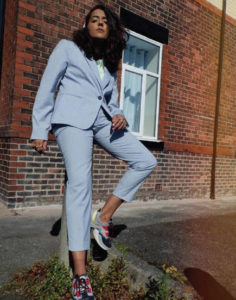 “It’s always mindset over matter” Arooj explains. “It’s easier said than done, but if you can start developing a stronger mindset, the world is your oyster. The minute I get up and be positive and do things, my life will change. I’ve tried to take on an attitude of recognizing how lucky I am – how lucky I am for healthcare, and for the life I do have. I’m lucky to have great friends, great family – and lucky to have a voice.” Of course, there are challenges. There are good days and bad. But building a community online, an extended network of supporters and friends, has helped Arooj stay strong and keep moving forward.
“It’s always mindset over matter” Arooj explains. “It’s easier said than done, but if you can start developing a stronger mindset, the world is your oyster. The minute I get up and be positive and do things, my life will change. I’ve tried to take on an attitude of recognizing how lucky I am – how lucky I am for healthcare, and for the life I do have. I’m lucky to have great friends, great family – and lucky to have a voice.” Of course, there are challenges. There are good days and bad. But building a community online, an extended network of supporters and friends, has helped Arooj stay strong and keep moving forward.
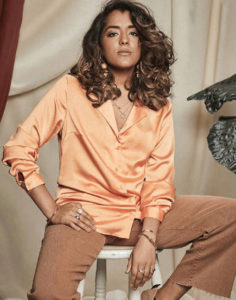 “One thing I want to be clear about” Arooj states “is that I haven’t beat NF – I’ve just accepted it". I’m not some superwoman who has suddenly overcome it. What I have tried to do is be open with it. Accepting and overcoming are two different things: but what has helped me is hearing stories of other people and knowing that I’m not alone.”
“One thing I want to be clear about” Arooj states “is that I haven’t beat NF – I’ve just accepted it". I’m not some superwoman who has suddenly overcome it. What I have tried to do is be open with it. Accepting and overcoming are two different things: but what has helped me is hearing stories of other people and knowing that I’m not alone.”
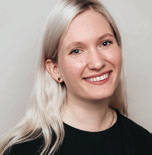 Brittany McGillivray is an editor and content strategist based in Vancouver BC. She has an MA in New Media and Digital Culture from the University of Amsterdam and a BA in Literature from McGill. As an avid reader, writer, and aspiring poet, she cares most about community, feminism, and giving a platform to all voices.
Brittany McGillivray is an editor and content strategist based in Vancouver BC. She has an MA in New Media and Digital Culture from the University of Amsterdam and a BA in Literature from McGill. As an avid reader, writer, and aspiring poet, she cares most about community, feminism, and giving a platform to all voices.
